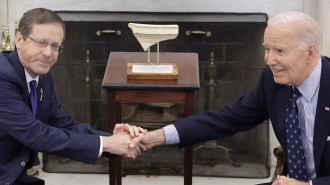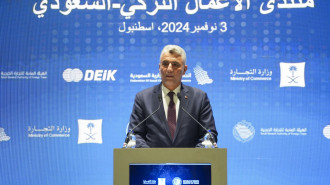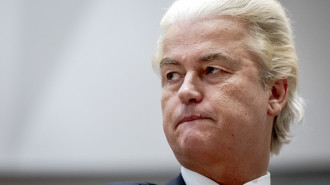UAE supports Egypt's Sisi with $1 billion deposit
UAE supports Egypt's Sisi with $1 billion deposit
The UAE announced it will deposit $1 billion into Egypt's central bank in a "show of support" for President Abdel Fattah al-Sisi, as the country's economic crisis worsens.
3 min read
Sisi advocates austerity while the UAE has given Egypt billions [Getty]
The United Arab Emirates agreed Monday to deposit $1 billion into Egypt's central bank in a new show of support for President Abdel Fattah al-Sisi, state news agency WAM said.
The announcement comes as Egypt grapples with a dollar shortage and dwindling foreign reserves, and as Sisi has been preparing public opinion for economic reform measures, including further subsidy cuts.
The $1 billion deposit, which is for a six-year period, comes as part of the UAE's "unwavering position in supporting Egypt and its people" and in recognition of Egypt's "pivotal role in the region", WAM said.
Egypt has already received more than $20 billion in aid from Gulf countries that supported the overthrow of Sisi's predecessor Mohamed Morsi, but that has not stemmed the decline of its economy.
The UAE, which considers Morsi's Muslim Brotherhood movement to be a "terrorist" group, has been among the strongest backers of Sisi's government.
The Gulf state also financed the Tamarod movement that campaigned for the overthrow of Morsi.
In April, it allocated $4 billion to support Egypt - $2 billion in investment and another $2 billion to be deposited at the central bank to support foreign exchange reserves.
Sisi and the central bank have come under rising criticism amid an acute dollar crunch which has led to a rise in prices including of medicines, with hundreds of products becoming unavailable or hard to find.
Some Egyptian firms have also scaled back their business activity as they struggle to find dollars to import raw materials.
In March, the bank devalued the Egyptian pound by 14.3 percent to 8.95 to the US dollar amid a shortage which has worsened in the past few months, with black markets offering the dollar at much higher rates.
This month, the International Monetary Fund said that it had reached an initial agreement to lend $12 billion to Egypt, in a three-year deal which the government hopes will provide a lifeline to the North African nation.
The announcement comes as Egypt grapples with a dollar shortage and dwindling foreign reserves, and as Sisi has been preparing public opinion for economic reform measures, including further subsidy cuts.
The $1 billion deposit, which is for a six-year period, comes as part of the UAE's "unwavering position in supporting Egypt and its people" and in recognition of Egypt's "pivotal role in the region", WAM said.
Egypt has already received more than $20 billion in aid from Gulf countries that supported the overthrow of Sisi's predecessor Mohamed Morsi, but that has not stemmed the decline of its economy.
The UAE, which considers Morsi's Muslim Brotherhood movement to be a "terrorist" group, has been among the strongest backers of Sisi's government.
The Gulf state also financed the Tamarod movement that campaigned for the overthrow of Morsi.
In April, it allocated $4 billion to support Egypt - $2 billion in investment and another $2 billion to be deposited at the central bank to support foreign exchange reserves.
 |
Sisi and the central bank have come under rising criticism amid an acute dollar crunch which has led to a rise in prices including of medicines, with hundreds of products becoming unavailable or hard to find. |  |
Some Egyptian firms have also scaled back their business activity as they struggle to find dollars to import raw materials.
In March, the bank devalued the Egyptian pound by 14.3 percent to 8.95 to the US dollar amid a shortage which has worsened in the past few months, with black markets offering the dollar at much higher rates.
This month, the International Monetary Fund said that it had reached an initial agreement to lend $12 billion to Egypt, in a three-year deal which the government hopes will provide a lifeline to the North African nation.
However, the IMF loan has fueled fears of a new wave of austerity measures in Egypt, with Sisi saying that he "will not hesitate" to take hard decisions.
He also called on Egyptians - especially "the great Egyptian lady" - to use less electricity and water.
After the election of Abdel Fattah al-Sisi in 2014, Egypt slashed energy subsidies by a third for the budget year 2014-2015.
In the months following the cuts, the prices of petrol, natural gas and diesel rose, driving up prices of goods and transport and fueling inflation. The Consumer Protection Agency warned that the price of some goods may rise 200 percent.







 Follow the Middle East's top stories in English at The New Arab on Google News
Follow the Middle East's top stories in English at The New Arab on Google News


